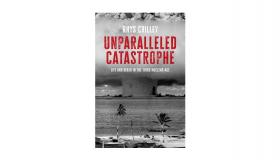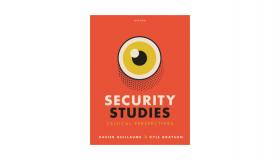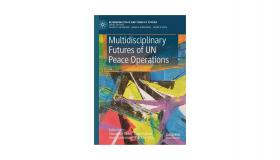
Breadcrumbs navigation
The latest in IR - autumn book round up
Welcome to our quarterly book round up. Each quarter we bring you updates on the latest International Studies releases by BISA members. To be included in the next update contact Communications Manager, Chrissie Duxson: Chrissie.Duxson@bisa.ac.uk
Making Global Society
A Study of Humankind Across Three Eras
Barry Buzan

Barry Buzan is Emeritus Professor of International Relations at the LSE (formerly Montague Burton Professor); honorary professor at Copenhagen, Jilin, and China Foreign Affairs Universities; a Senior Fellow at LSE Ideas; and a Fellow of the British Academy.
Blurb
Barry Buzan proposes a new approach to making International Relations a truly global discipline that transcends both Eurocentrism and comparative civilisations. He narrates the story of humankind as a whole across three eras, using its material conditions and social structures to show how global society has evolved. Deploying the English School's idea of primary institutions and setting their story across three domains - interpolity, transnational and interhuman - this book conveys a living historical sense of the human story whilst avoiding the overabstraction of many social science grand theories. Buzan sharpens the familiar story of three main eras in human history with the novel idea that these eras are separated by turbulent periods of transition. This device enables a radical retelling of how modernity emerged from the late 18th century. He shows how the concept of 'global society' can build bridges connecting International Relations, Global Historical Sociology and Global/World History.
Find out more and purchase the book via the Cambridge University Press website. BISA members receive 40% off using the code in your joining/renewal email as this book is part of our book series.
Unparalleled catastrophe
Life and death in the Third Nuclear Age
Rhys Crilley

Rhys Crilley is a Lecturer in International Relations at the University of Glasgow
Blurb
After the first use of nuclear weapons in 1945, Albert Einstein warned that 'we thus drift towards unparalleled catastrophe'. Today we are no longer drifting but racing toward catastrophe at breakneck speed. This book analyses recent events that have brought about a dangerous Third Nuclear Age. From the collapse of arms control treaties and the development of hypersonic missiles, to the pop culture that shapes how we think about nuclear weapons, via how nuclear weapons intersect with the global threats posed by pandemics, populism, climate change, corruption, militarism, and racism, this book explores the nuclear zeitgeist of today. It presents the case for critical nuclear studies, and provides an important intervention into debates about nuclear weapons and international security. Today, the planet stands on the brink of catastrophe. This book tells you why, and what we can do about it.
Find out more and purchase the book via the Manchester University Press website.
Security Studies
Critical Perspectives
Xavier Guillaume and Kyle Grayson

Xavier Guillaume is an Associate Professor in International Relations at the University of Groningen, the Netherlands.
Kyle Grayson is a Professor of Security, Politics, and Culture and Head of the School of Geography, Politics, and Sociology at Newcastle University, UK.
Blurb
Security Studies: Critical Perspectives introduces the analysis of security from critical and interdisciplinary perspectives. Taking a student centred approach to understanding contemporary security themes and cases, it provides an accessible set of analytic steps so that students can develop the critical thinking skills and confidence to ask important questions about security in contemporary politics. Common sense security assumptions that reproduce forms of oppression and domination are revealed and their justifications decentred while perspectives inclusive of gender and sex, ethnicity and race, religion, disability, culture and ideology, political belonging, and the global south are introduced. In doing so, SSCP combines critical analysis with concrete empirical issues that connect students to the social and political worlds around them. It includes five foundation chapters and 15 thematic chapters written by leading experts on security issues ranging from borders to war as well as online illustrative case studies, short introductions to key theoretical approaches, and a guide for instructors.
Find out more and purchase the book from the OUP website. Please use promotion code WEBXSTU20 for 25% off.
Multidisciplinary Futures of UN Peace Operations
Alexander Gilder, David Curran, Georgina Holmes, Fiifi Edu-Afful

Alexander Gilder is Associate Professor of International Law and Security at the School of Law, University of Reading, UK and Associate Faculty at the School of Humanitarian Studies, Royal Roads University, Canada.
David Curran is Associate Professor and Research Group Leader: Security, Vulnerability and Resilience at the Centre for Trust, Peace, and Social Relations, Coventry University, UK. He is also a convener of the BISA Peacekeeping and Peacebuilding Working Group.
Georgina Holmes is Lecturer in Politics and International Studies at the School of Social Sciences and Global Studies, The Open University, UK.
Fiifi Edu-Afful is Senior Research Fellow at the Kofi Annan International Peacekeeping Training Centre, Ghana.
Blurb
Bringing together multidisciplinary perspectives on the future of UN peace operations, this book explores the interrelated dynamics of UN peace operations and peacebuilding practices through the lenses of conflict resolution, protection and accountability. The collection includes coverage of issues ranging from strengthening partnerships between regional institutions and the UN; improving UN policing and stabilisation mechanisms; the application of new technologies in peace operations and implementing security sector reform; to ending sexual exploitation and abuse and enhancing the protection of children. Authors place people at the centre of peacekeeping by interrogating current and past UN initiatives, chart how peacekeeping is evolving in response to changes in global security, assess reform and norm change within missions themselves, and offer original perspectives on the future of UN peace operations. Contributions also include new and innovative theoretical and empirical research located across multiple disciplines, including political science, history, law, gender studies, and criminology.
Find out more and purchase the book from the Palgrave Macmillan website.
On Global Learning
Pragmatic Constructivism, International Practice and the Challenge of Global Governance
Jason Ralph

Jason Ralph is Professor of International Relations and former Head of the School of Politics and International Studies. He was also Honorary Professor of International Relations at the University of Queensland. He is currently an editor of the BISA journal European Journal of International Security.
Blurb
Global security, climate and health challenges have all created a deep-seated unease about international society's capacity to cope with change. International Relations should help practitioners develop appropriate responses, but Jason Ralph argues that IR would be better positioned to do so if it drew more explicitly on the insights of classical Pragmatism. By bringing this tradition in from the margins, Ralph comprehensively engages norm, practice, realist and global IR theory to extend the 'new constructivist' research agenda in a normative direction. He develops a 'Pragmatic Constructivist' approach to assess how well communities of practice facilitate the learning that mitigates emergent social problems and improves lived experiences. This normative assessment focuses on the extent to which communities of practice are characterized by inclusive reflexivity and deliberative practical judgment. These two tests are then applied to critique existing communities of practice, including the UN Security Council, the UNFCCC and the WHO.
Find out more and purchase the book via the Cambridge University Press website. BISA members receive 40% off using the code in your joining/renewal email as this book is part of our book series.
The Birth of Psychological War
Propaganda, Espionage, and Military Violence from WWII to the Vietnam War
Jeffrey Whyte

Jeffrey Whyte is a Lecturer in International Relations at Lancaster University. He holds a PhD in Geography from the University of British Columbia, and an MA in Communications from Simon Fraser University. His work explores the political history of psychological warfare in the United States.
Blurb
The Birth of Psychological War explores the history, politics, and geography of United States psychological warfare in the 20th century against the backdrop of the contemporary 'post-truth era'. From its origins in the Second World War, to the United States' counterinsurgency campaigns in Vietnam, Whyte traces how the theory and practice of psychological warfare transformed the relationship between the home front and theatres of war. Whyte interrogates the broader political mythologies that animate popular conceptions of psychological war, such as its claim to make war more humane and less violent.On the contrary, The Birth of Psychological War demonstrates the role of psychological warfare in expanding the scope and scale of military violence amidst ostensible efforts to 'win hearts and minds'. While casting a critical eye on psychological warfare, Whyte establishes its continued significance for the contemporary student of international relations.
Find out more and purchase the book from the OUP website.
If you're a BISA member and you'd like your book included in next quarter's round up, email Communications Manager, Chrissie Duxson: Chrissie.Duxson@bisa.ac.uk. Please include the title, blurb and a link to where the book can be purchased. If you are able, you can also include details of any discount available, but of course this is not required. The book should have been published a maximum of six months prior to your email.
Top photo by Phil Hearing on Unsplash